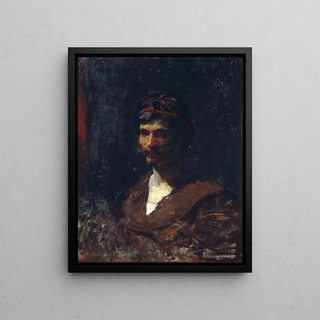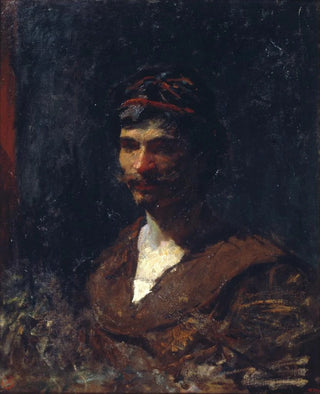Art print | Bust of a man allegory of Bacchus - Mariano Fortuny Marsal


View from behind

Frame (optional)
Art print Buste of a man, allegory of Bacchus - Mariano Fortuny Marsal – Captivating introduction
The "Buste of a man, allegory of Bacchus" by Mariano Fortuny Marsal is a work that evokes both the richness of classical culture and the technical virtuosity of the artist. This piece, emblematic of the romantic spirit of the 19th century, embodies the very essence of Bacchus, the god of wine, joy, and ecstasy. Through this bust, Fortuny manages to capture not only the physical features of a man but also the soul of a mythological character, offering a fascinating glimpse into the universe of ancient deities. The work stands out for its ability to transcend time, inviting the viewer to reflect on human nature and its pleasures.
Style and uniqueness of the work
Fortuny's style is characterized by striking realism, combined with a romantic sensitivity that brings his subjects to life. In this bust, every detail is meticulously crafted, from the contours of the face to the expressions that seem to vibrate with their own life. The texture of the material, whether smooth or more rugged, enhances the presence of the figure, while the choice of volumes emphasizes the dynamism of the piece. The allegory of Bacchus is also highlighted by symbolic elements, such as grape leaves, which evoke the indissoluble link between man and nature. This blend of tradition and innovation makes this piece a true ode to the beauty and complexity of human emotions.
The artist and his influence
Mariano Fortuny Marsal, born in 1838 in Granada, is an emblematic figure of the Spanish artistic movement of the 19th century. Influenced by Romanticism and Realism, he established himself as a master in painting and sculpture. His fascination with mythological and historical themes, as well as his talent for representing light and color, allowed him to create works that still resonate today. Fortuny also played an important role in the development of modern art in Spain, inspiring many contemporary artists with his innovative approach and ability to fuse different techniques. His legacy endures through works like the "B

Matte finish

View from behind

Frame (optional)
Art print Buste of a man, allegory of Bacchus - Mariano Fortuny Marsal – Captivating introduction
The "Buste of a man, allegory of Bacchus" by Mariano Fortuny Marsal is a work that evokes both the richness of classical culture and the technical virtuosity of the artist. This piece, emblematic of the romantic spirit of the 19th century, embodies the very essence of Bacchus, the god of wine, joy, and ecstasy. Through this bust, Fortuny manages to capture not only the physical features of a man but also the soul of a mythological character, offering a fascinating glimpse into the universe of ancient deities. The work stands out for its ability to transcend time, inviting the viewer to reflect on human nature and its pleasures.
Style and uniqueness of the work
Fortuny's style is characterized by striking realism, combined with a romantic sensitivity that brings his subjects to life. In this bust, every detail is meticulously crafted, from the contours of the face to the expressions that seem to vibrate with their own life. The texture of the material, whether smooth or more rugged, enhances the presence of the figure, while the choice of volumes emphasizes the dynamism of the piece. The allegory of Bacchus is also highlighted by symbolic elements, such as grape leaves, which evoke the indissoluble link between man and nature. This blend of tradition and innovation makes this piece a true ode to the beauty and complexity of human emotions.
The artist and his influence
Mariano Fortuny Marsal, born in 1838 in Granada, is an emblematic figure of the Spanish artistic movement of the 19th century. Influenced by Romanticism and Realism, he established himself as a master in painting and sculpture. His fascination with mythological and historical themes, as well as his talent for representing light and color, allowed him to create works that still resonate today. Fortuny also played an important role in the development of modern art in Spain, inspiring many contemporary artists with his innovative approach and ability to fuse different techniques. His legacy endures through works like the "B






